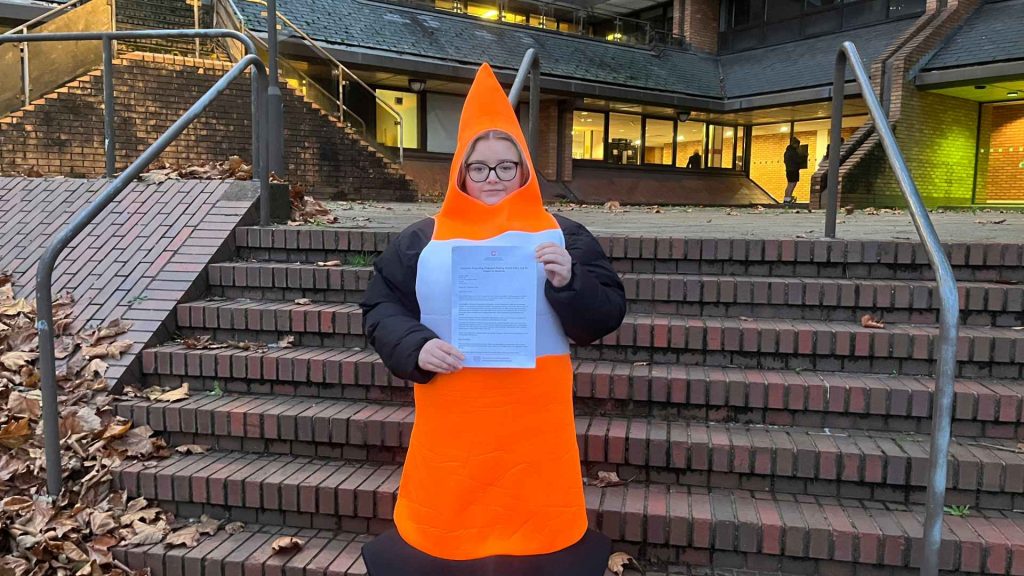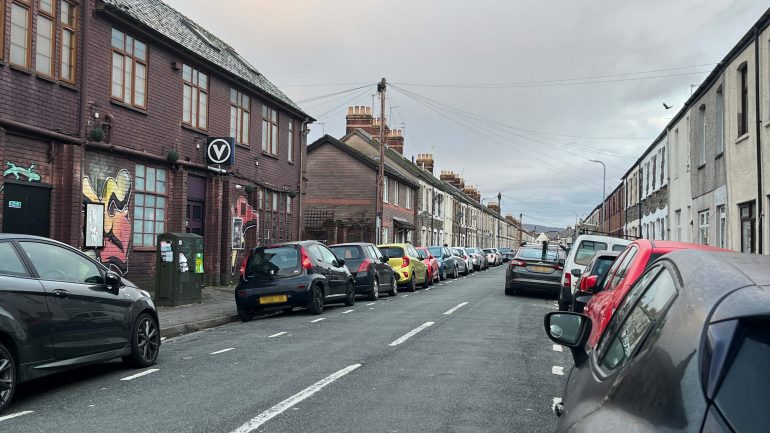Limiting parking for students is part of a package of plans designed to ease traffic pressures faced by the city
PROPOSALS to ease parking pressures in Cardiff by limiting parking permits for students has raised questions over who gets priority for parking.
Cardiff University Students’ Union president Madison Hutchinson said the council proposal to not provide student-only properties with parking permits was “trying to strip students of their rights”.
Speaking at a protest outside County Hall as councillors met to discuss the issue last Thursday, November 28, she said the protest against the proposal was “bigger than parking”.
Responding to the SU’s claim that students have a right to park, council leader Huw Thomas said: “Nobody has a God-given right to parking.
“As annoying as the current position might be to students, they only have to cope with it for part of the year, and for a limited number of years,” he added. “For long-standing residents who live in the inner city wards all their lives … this is an ongoing issue.”
Why is parking changing in Cardiff?
As the city has grown, demand for parking has increased, leading to congestion and pollution in the process. Competition for spaces has become more intense, and any unfilled space is often taken by commuters, taking away space from residents and visitors who need it. Add image
What are the new parking zones the council is proposing?
The proposal would divide the city into two parking areas, a central one covering an area from the bay to Gabalfa and across from Canton to Splott, and a zone covering everywhere else. Within the central zone, different rules will apply for different areas of the city.
What rules will apply in central Cardiff?
Central Cardiff will be split into four areas, each with different parking rules. In the city centre itself, no properties will be allowed parking permits, and on-street parking will be reserved for taxis, deliveries and blue badge holders. In the inner city, which covers Cathays, Grangetown, Butetown, Adamstown and Plasnewydd, parking permits will be issued to only residents, community premises, and carers, to prevent spaces being used by commuters or visitors to the city. Those without permits will only be able to park for up to four hours in pay and stay parking bays.
What about the rest of Cardiff?
In Cardiff bay, covering Butetown, parking spaces will be divided between those for permit holders, and those for cars without permits that can be used for a limited amount of time, either for free or for a charge. In the outer area, covering Canton, Gabalfa, Splott and parts of the inner parking area, parking restrictions will be introduced across the entire area to prevent commuters or drivers from leaving their vehicles for long periods, making it difficult for visitors and residents to find spaces.
The proposal says that an end to parking permits for students will “reduce the impact on local residents”.
Residents across the city were invited to give their views in a consultation exercise, which ended on December 1.
The plans for the city also include dividing Cardiff into two parking zones, with cars in the central area of Cardiff facing stricter parking restrictions to meet a higher demand for spaces.
Maindy Road resident Dan agreed with the proposal, saying that if fewer students brought cars to university more space would be available for local residents.
Yet, resident Dylan who works at Aquatic World on Crwys Road, questioned whether students would still choose to go to university in Cardiff if they were unable to easily park their car.
For others, such as Crwys Key Cutting shop owner Scott Buglass, a simple ban on student permits would not ease parking pressures, he said.
Rather, he believes the emphasis on residential parking in the area has made short-stay parking difficult to find along Crwys Road.
This problem has been made worse by the use of remaining parking space by commuters choosing not to pay for city centre parking, he added.
As customers need spaces to park, Mr Buglass said that if they have to search for spaces, it’s easier to go elsewhere, such as to a Timpson’s out of town where parking is available.
Cardiff SU claims the proposal unfairly targets students and argues that they deserve the same parking space available to any other resident.

“A lot of us can’t even drive ourselves, we just want to make sure people have the right to,” said SU officer Shola Bold.
Though the proposal claims limiting parking permits would “promote the use of active and sustainable travel,” some doubt whether public transport can meet the needs of all students.
Ms Bold criticises the proposal for assuming that public transport can meet student needs, particularly for those on medical placements who have to travel long distances for work.
Admitting that parking is Cathays was an issue, politics student Miles Davis said that public transport needs to first be improved in order to deal with it, pointing to a lack of bus stops within Cathays itself.
“If you’re going to take permits away from students, at least give them something else,” he said.
Should the proposal be approved, changes will not be brought in till Autumn 2026, the council has said. But parking continues to place pressure on the city
Speaking from behind the counter at Aquatic World, Dylan said that city parking changes “can’t be any worse than they are now”.
The public consultation on parking changes has now closed, but further information on the council’s city parking plan can be found here.



